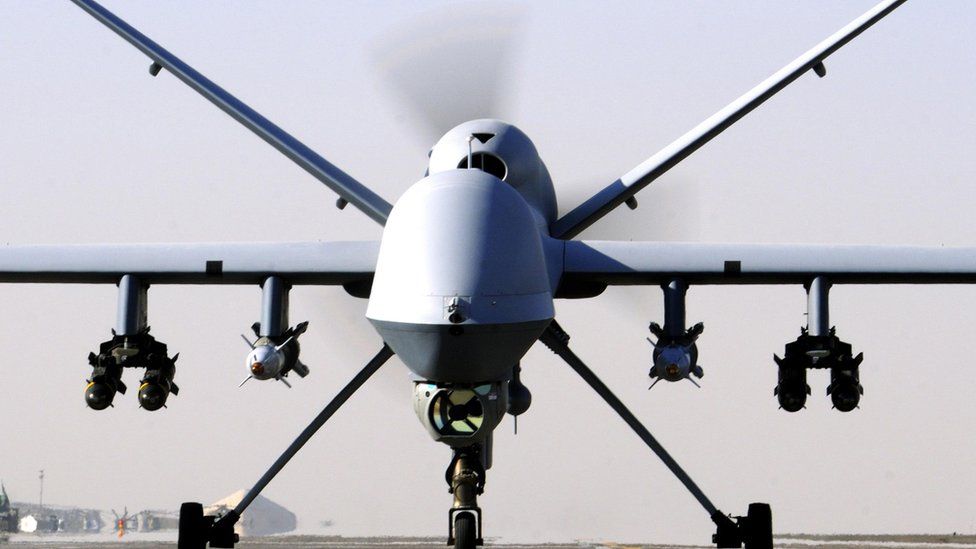UK drone fleet to double in fight against IS, says PM
- Published

David Cameron has promised to increase Britain's military capability to fight Islamic State militants in Iraq and Syria, including a doubling of the RAF's fleet of drones.
The prime minister also told the Sunday Telegraph the UK would spend hundreds of millions of pounds on state-of-the-art equipment for special forces.
He said it was essential to meet the terrorist threat facing the UK.
He was speaking as the Tories gather in Manchester for their party conference.
Last month, Mr Cameron announced an RAF-operated drone had killed two Britons linked to IS in Syria, describing the action as an "act of self defence".
'Beefed up'
He told the Sunday Telegraph the UK would replace its 10 Reaper drones with "twice as many" of a new drone called Protector - capable of flying longer distances and carrying more advanced weapons and equipment.
Mr Cameron said they would "keep us safe and to give us the intelligence and information and potentially give us the capacity to hit people who are potentially planning to hit us".
He also said the SAS and other elite special forces would get new equipment and weapons to ensure they were "properly beefed up".
The forces would get extra recruitment if they requested it, he added.
The prospect of extending UK military strikes against IS from the current operation in Iraq to also include Syria is opposed by Labour's new leader Jeremy Corbyn.
But, amid reports that a number of Labour MPs could support action in Syria, Mr Cameron told the Sunday Telegraph he believed it "may well become possible" to win Commons backing.
Analysis
By BBC political correspondent Ben Wright
The conference will provide a guide to what the Tories will do with their election victory mandate.
But they will want to avoid triumphalism, not least because there are more significant spending cuts to come.
They will seek to draw a sharp contrast on the economy and defence with Labour - framing themselves as the guarantors of stability.
With David Cameron announcing he will not carry on beyond the next election, this conference is also a possible chance for successors like George Osborne, Theresa May and Boris Johnson to parade before the party.
The issue of Europe could well flare up too. Mr Cameron may well come under pressure to spell out more clearly what he wants from his EU renegotiation.
Cabinet ministers might be tempted to say how they would vote in the referendum, once that process is complete, and once again Europe could consume conference debate.
Mr Cameron said that "an enhancement of our special forces and particularly on the issue of surveillance aircraft" was a necessary response to one of the country's "biggest threats".
He said the use of drones was "obviously a last resort".
He added: "We try and take every step we can but at the end of the day we have to keep the British people safe from terrorist threats."
The prime minister, who arrived in Manchester on Saturday for the first autumn conference of a majority Conservative administration since 1996, faces a protest against the government's austerity measures.
It is thought that up to 80,000 people will attend a demonstration organised by the TUC, with a march due to take place on streets close to the Manchester Central venue where the conference is being held.
- Published3 October 2015
- Published4 October 2015
- Published3 October 2015
- Published30 September 2015
- Published26 September 2015
- Published17 September 2015